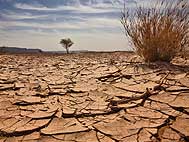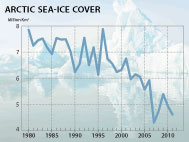| SEARCH |
-

Nov 17, 2015
Reflections on a three-decade legacy
The International Geosphere-Biosphere Programme (IGBP) will come to a close at t...
-
Nov 17, 2015
Use of and access to content on this website
Text and images produced by IGBP in house are free to use with appropriate credi...
-
Nov 12, 2015
Bella Gaia performance and panel discussion to mark IGBP's closure
A musical performance by Bella Gaia will celebrate the achievements and legacy o...
-

Towards Future Earth:
evolution or revolution?
During its three decades of existence, the International Geosphere-Biosphere Pro...
-
A personal note on IGBP and the social sciences
Humans are an integral component of the Earth system as conceptualised by IGBP. João Morais recalls key milestones in IGBP’s engagement with the social sciences and offers some words of advice for Future Earth.
-
IGBP and Earth observation:
a co-evolution
The iconic images of Earth beamed back by the earliest spacecraft helped to galvanise interest in our planet’s environment. The subsequent evolution and development of satellites for Earth observation has been intricately linked with that of IGBP and other global-change research programmes, write Jack Kaye and Cat Downy .
-
Deltas at risk
Around 500 million people worldwide live on deltas, but many of the world's deltas are sinking due ...
-
Climate change: the state of the science
A new data visualization released on the first day of the plenary negotiations at the UNFCCC’s clima...
-
Climate Change:
the State of the Science
Videos now online from the Stockholm public forum to mark the launch of the IPCC's climate report, 2...

Downscaling planetary boundaries for regions
Lead author: John Dearing, University of Southampton
New open-access paper published in the journal Global Environmental Change, "Safe and just operating spaces for regional and social-ecological systems" based on IGBP workshop.

Abstract:
Humanity faces a major global challenge in achieving wellbeing for all, while simultaneously ensuring that the biophysical processes and ecosystem services that underpin wellbeing are exploited within scientifically informed boundaries of sustainability.
We propose a framework for defining the safe and just operating space for humanity that integrates social wellbeing into the original planetary boundaries concept (Rockström et al., 2009a,b) for application at regional scales.
We argue that such a framework can: (1) increase the policy impact of the boundaries concept as most governance takes place at the regional rather than planetary scale; (2) contribute to the understanding and dissemination of complexity thinking throughout governance and policy-making; (3) act as a powerful metaphor and communication tool for regional equity and sustainability.
We demonstrate the approach in two rural Chinese localities where we define the safe and just operating space that lies between an environmental ceiling and a social foundation from analysis of time series drawn from monitored and palaeoecological data, and from social survey statistics respectively. Agricultural intensification has led to poverty reduction, though not eradicated it, but at the expense of environmental degradation. Currently, the environmental ceiling is exceeded for degraded water quality at both localities even though the least well-met social standards are for available piped water and sanitation. The conjunction of these social needs and environmental constraints around the issue of water access and quality illustrates the broader value of the safe and just operating space approach for sustainable development.
DOI: 10.1016/j.gloenvcha.2014.06.012

IGBP closed at the end of 2015. This website is no longer updated.
-

Global Change Magazine No. 84
This final issue of the magazine takes stock of IGBP’s scientific and institutional accomplishments as well as its contributions to policy and capacity building. It features interviews of several past...
-

Global Change Magazine No. 83
This issue features a special section on carbon. You can read about peak greenhouse-gas emissions in China, the mitigation of black carbon emissions and the effect of the 2010-2011 La Niña event on gl...
-
INTERGOVERNMENTAL PANEL ON CLIMATE CHANGE:
How green is my future?
UN panel foresees big growth in renewable energy, but policies will dictate just how big.
-
UK:
'The Anthropocene: a new epoch of geological time?'
Royal Society, Philosphical Transactions A




















